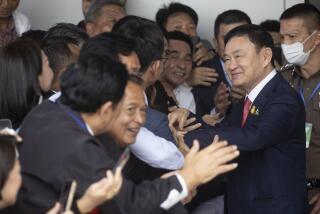SOUTHEAST ASIA : Some No-Shows at Thailand Power Breakfast : Generals, outmaneuvered in recent months, boycott a weekly session with the prime minister. But they remain a potent political force.
- Share via
BANGKOK, Thailand — Not showing up for a power breakfast might not seem like the makings of a major political crisis, unless the host is Thai Prime Minister Chatchai Choonhavan and the invited guests are the commanders of Thailand’s armed forces.
Since late November, Thailand’s restive military commanders have boycotted their normal Wednesday morning session with Chatchai, who is Thailand’s first elected prime minister in 12 years. Their defiance is a sign that the army is trying to regain its political footing after 2 1/2 years of democratic rule, shaking business confidence in the future.
While the army is subordinate to civilian rulers in places such as the United States, it plays a more parallel role in Thailand. For example, while the government operates two television stations, the army operates two of its own.
The military has staged 16 coups in the last 60 years, but the last two, in 1981 and 1985, failed to win any support outside the barracks. (In 1985, the tanks got stuck in Bangkok’s notorious traffic.) At the same time, the civilian government has been a patchwork affair, involving coalitions of five or more parties just to hold on to power.
The present political crisis began last March, when Chatchai persuaded his old adversary, Army Supreme Commander Chavalit Yonchaiyudh, to resign his post and join the government as deputy defense minister.
Within weeks, a junior minister in Chatchai’s government, Chalerm Yubamrung, was trading accusations of corruption with Chavalit, at one point alleging that the general’s wife was a “walking jewelry box.”
Finally, Chavalit resigned, citing loss of dignity, and set up his own party, with which he is widely expected to seek the premiership himself.
Meanwhile, Chalerm became embroiled in another dispute with the army when soldiers seized one of his ministry’s trucks for allegedly eavesdropping on military communications.
According to the Thai press, the armed forces demanded that Chatchai fire Chalerm and two other government ministers widely suspected of corruption. Chatchai, who enjoys considerable popularity at a time of double-digit economic growth, reshuffled his government several times but kept Chalerm and the two others. Those moves earned him the nickname “an eel on roller skates” in the local newspapers.
Pressure from the military may well have backfired, with civilian leaders openly protesting the army’s heavy-handed intrusion into the political arena.
The crisis finally came to a head Dec. 8, when the military-civilian paralysis forced Chatchai to resign. King Bhumibol Adulyadej immediately reappointed him, but this time Chalerm was missing from the new government.
Thailand’s recent economic boom has dramatically increased the wealth of the country. A spate of infrastructure projects, ranging from an overhaul of the telephone system to new highways and mass transit, have brought a flood of accusations that ministers are personally profiting from the boom.
The military’s commanders maintain that they are trying to protect the public from a corrupt administration that came to power through vote-buying. Their critics argue that the generals are more concerned with a share of the spoils.
In a New Year’s Day interview, Chatchai expressed concern about the practice of vote-buying, which is widespread in the country and goes beyond the usual beer and sandwiches on election day. But he has yet to dispel the image of corruption surrounding his government, despite his anguished denials that he has a $10-million Swiss bank account.
While outmaneuvered in the recent political realignments, the military remains a potent force in Thai politics.
And the generals still aren’t attending those Wednesday morning breakfasts.
More to Read
Sign up for Essential California
The most important California stories and recommendations in your inbox every morning.
You may occasionally receive promotional content from the Los Angeles Times.













